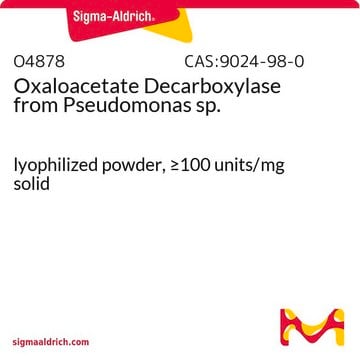MAK070
Oxaloacetate Assay Kit
sufficient for 100 colorimetric or fluorometric tests
About This Item
Produits recommandés
Utilisation
sufficient for 100 colorimetric or fluorometric tests
Méthode de détection
colorimetric
fluorometric
Maladie(s) pertinente(s)
cancer
Température de stockage
−20°C
Description générale
Application
Adéquation
Principe
Remplacé(e)(s) par
Mention d'avertissement
Danger
Mentions de danger
Conseils de prudence
Classification des risques
Eye Irrit. 2 - Resp. Sens. 1 - Skin Sens. 1
Code de la classe de stockage
10 - Combustible liquids
Certificats d'analyse (COA)
Recherchez un Certificats d'analyse (COA) en saisissant le numéro de lot du produit. Les numéros de lot figurent sur l'étiquette du produit après les mots "Lot" ou "Batch".
Déjà en possession de ce produit ?
Retrouvez la documentation relative aux produits que vous avez récemment achetés dans la Bibliothèque de documents.
Articles
Sigma article discusses tumor cell metabolic pathways, focusing on aerobic glycolysis and mitochondrial activity.
Fatty acid synthesis supports cancer cell proliferation, essential for membrane generation, protein modification, and bioenergetics.
Notre équipe de scientifiques dispose d'une expérience dans tous les secteurs de la recherche, notamment en sciences de la vie, science des matériaux, synthèse chimique, chromatographie, analyse et dans de nombreux autres domaines..
Contacter notre Service technique






